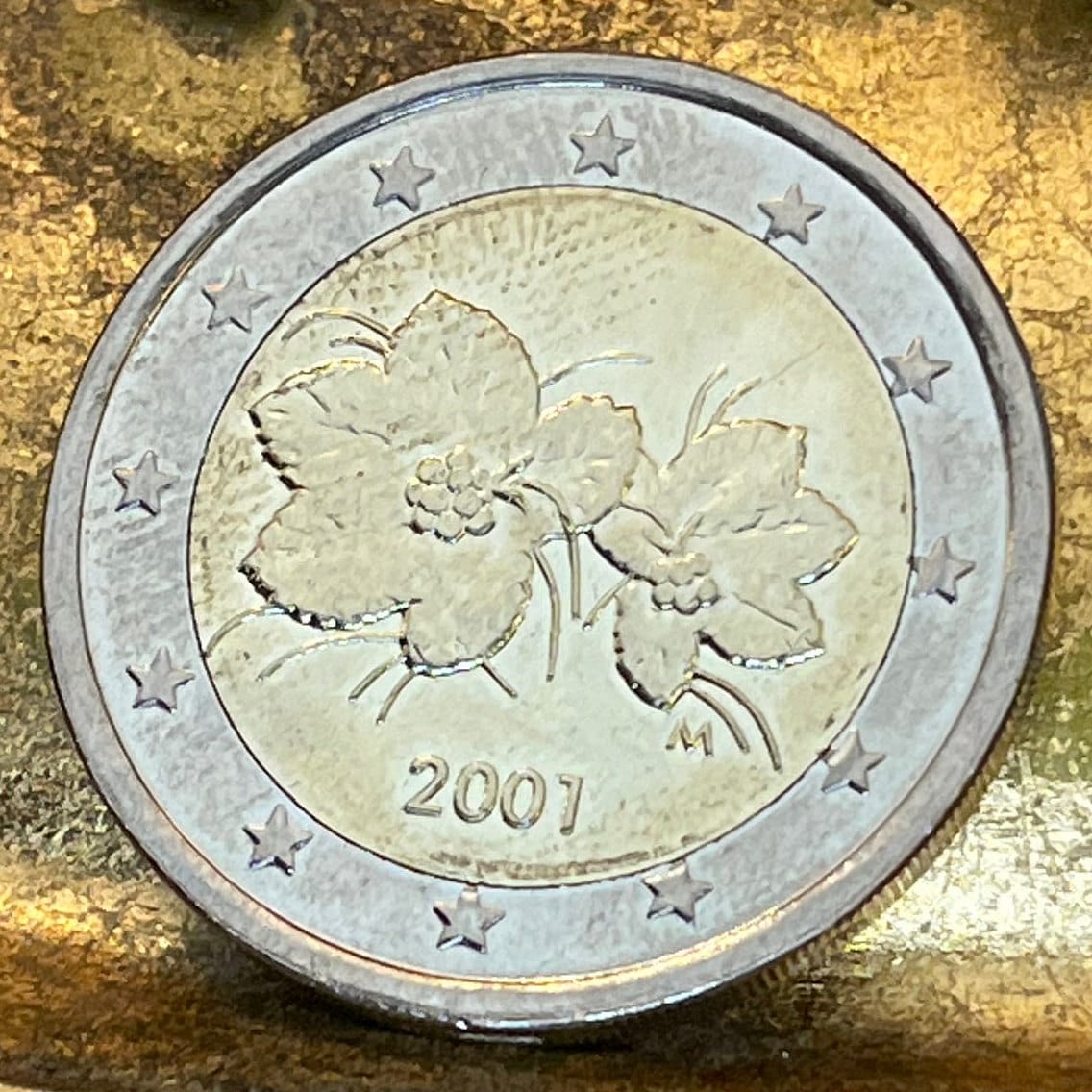elemintalshop
Cloudberry Flowers & Berries 2 Euros Finland Authentic Coin Money for Jewelry and Craft Making (Bimetallic)
Cloudberry Flowers & Berries 2 Euros Finland Authentic Coin Money for Jewelry and Craft Making (Bimetallic)
Couldn't load pickup availability
Cloudberry Flowers & Berries 2 Euros Finland Authentic Coin Money for Jewelry and Craft Making (Bimetallic)
Obverse: Cloudberry flowers and berries.
Reverse: A map shows the fifteen states of the European Union
Lettering: 2 EURO LL
Edge
Reeded with incise lettering: "SUOMI FINLAND" and three lion's heads.
Lettering: SUOMI FINLAND
Translation: FINLAND FINLAND
Features
Issuer Finland
Period Republic (1919-date)
Type Standard circulation coin
Years 1999-2006
Value 2 Euro
2 EUR = 2.35 USD
Currency Euro (2002-date)
Composition Bimetallic: nickel brass clad nickel center in copper-nickel ring
Weight 8.5 g
Diameter 25.75 mm
Thickness 2.2 mm
Shape Round
Orientation Medal alignment ↑↑
Number N# 96
References KM# 105, Schön# 106
Wikipedia:
Rubus chamaemorus is a species of flowering plant in the rose family Rosaceae, native to cool temperate regions, alpine and arctic tundra and boreal forest. This herbaceous perennial produces amber-colored edible fruit similar to the blackberry. English common names include cloudberry, nordic berry, bakeapple (in Newfoundland and Labrador), knotberry and knoutberry (in England), aqpik or low-bush salmonberry (in Alaska – not to be confused with salmonberry, Rubus spectabilis), and averin or evron (in Scotland).
When ripe, cloudberry fruits are golden-yellow, soft and juicy, and are rich in vitamin C. When eaten fresh, cloudberries have a distinctive tart taste. When over-ripe, they have a creamy texture somewhat like yogurt and a sweet flavor. They are often made into jams, juices, tarts, and liqueurs. In Finland, the berries are eaten with heated leipäjuusto (a local cheese; the name translates to "bread-cheese"), as well as cream and sugar. In Sweden, cloudberries (hjortron) and cloudberry jam are used as a topping for ice cream, pancakes, and waffles. In Norway, they are often mixed with whipped cream and sugar to be served as a dessert called multekrem (cloudberry cream), as a jam or as an ingredient in homemade ice cream. Cloudberry yoghurt—molte- or multeyoughurt—is a supermarket item in Norway.
In Newfoundland and Labrador, Canada, cloudberries are used to make "bakeapple pie" or jam. Arctic Yup'ik mix the berries with seal oil, reindeer or caribou fat (which is diced and made fluffy with seal oil) and sugar to make "Eskimo ice cream" or akutaq. The recipes vary by region. Along the Yukon and Kuskokwim River areas, white fish (pike) along with shortening and sugar are used. The berries are an important traditional food resource for the Yup'ik.
Extract of cloudberries is also used in cosmetics such as shower gels, hand creams and body lotions.
Alcoholic drinks
In Nordic countries, traditional liqueurs such as lakkalikööri (Finland) are made of cloudberry, having a strong taste and high sugar content. Cloudberry is used as a flavouring for making akvavit. In northeastern Quebec, a cloudberry liqueur known as chicoutai (aboriginal name) is made.
Cultural references
The cloudberry appears on the Finnish version of the 2 euro coin. The name of the hill Beinn nan Oighreag in Breadalbane in the Scottish Highlands means "Hill of the Cloudberries" in Scottish Gaelic. Transactions of Camden's Britain (1637 edition) indicates the etymological origins of 'cloud-berry', the plant's name in old Lancashire dialect: 'Pendelhill [in Lancashire] advenceth itselfe up the skie [..] and in the very top thereof bringeth forth a peculiar plant which, as though it came out of the clowdes, they tearme clowdes-berry'. In Norrland cloudberries are known as Norrland's gold.
Share



















